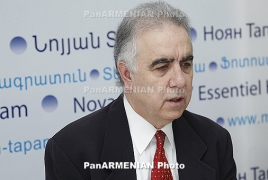
Publisher of the California Courier Harut Sassounian presents the article “Talaat’s Personal Account of The Armenian Massacres,” unveiling excerpts from the Genocide ringleader’s memoirs.
The article reads:
In my last week’s column, I reported that Talaat Pasha, the mastermind of the Armenian Genocide, had told British intelligence officer Aubrey Herbert in 1921 that he had written “a memorandum on the Armenian massacres.”
I would like now to present brief excerpts from Talaat’s lengthy account published in the November 1921 issue of Current History, the monthly magazine of the New York Times, titled: “Posthumous Memoirs of Talaat Pasha,” and subtitled: “The former Grand Vizier’s own account, written shortly before his assassination, of why and how Turkey entered the war - Secret alliance that preceded the conflict - Causes of the Armenian massacres as stated by the man who ordered them.”
In an introductory note, Current History editors explain how they obtained a copy of this revealing report: “…After Talaat’s death, the manuscript passed into the possession of his wife, who remained in Germany; she permitted the Paris correspondent of Vakit to reproduce the most interesting portions of it. These have been translated from Turkish for Current History by M. Zekeria, a native of Constantinople. They represent about fifty pages of the original manuscript, the opening sentence of which, “I do not tell all the truth, but all I tell is truth,” aroused a great sensation in Turkey.”
In his memoirs, as in his interview with Aubrey Herbert, Talaat tries to exonerate himself by blaming everyone else -- Armenians, Russians, even Turks -- for the Armenian massacres. He does not deny “the deportations of the Armenians, in some localities of the Greeks, and in Syria of some of the Arabs,” but claims that such reports “were exceedingly exaggerated.” Talaat then adds: “in saying this, I do not mean to deny the facts.”
The former Grand Vizier confesses: “I admit that we deported many Armenians from our eastern provinces, but we never acted in this matter upon a previously prepared scheme. The responsibility for these acts falls first of all upon the deported people themselves. Russia, in order to lay hand on our eastern provinces, had armed and equipped the Armenian inhabitants of this district, and had organized strong Armenian bandit forces in the said area.”
Attempting to repair his tarnished image, Talaat acknowledges the Turkish brutalities against Armenians: “I admit also that the deportation was not carried out lawfully everywhere. In some places unlawful acts were committed… I confess it.”
Talaat proceeds to provide excuses for not pursuing perpetrators of the Armenian massacres who “were short-sighted, fanatic, and yet sincere in their belief.”
To set the record straight, Talaat’s claims that Armenians stabbed Turkey in the back during WWI are completely false. Minister of War Enver Pasha, Commander-in-Chief of the Ottoman Armed Forces, in a letter to the Bishop of Konya, praised the bravery of Turkish-Armenian soldiers fighting against the Russian Army in the winter of 1914-1915.
Ironically, Talaat’s assertion that his government would have taken brutal actions against Armenians even at “a time of peace” reconfirms long-standing Turkish genocidal practices as previously demonstrated by the Hamidian and Adana massacres of Armenians which were carried out when there were no wars.

